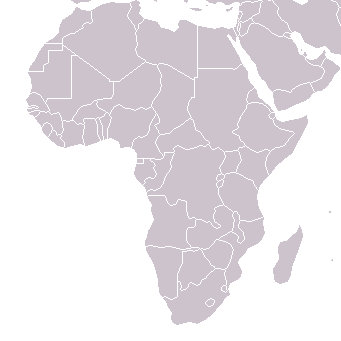They call it "Mother Africa", which is justified considering that we have all descended from it. In fact, this continent of mother Africa was embedded with all the other continents into a larger supercontinent called Pangaea about 250 million years ago. But this is not when we as a human species would have originated. Rather, this happened about five million years ago with the evolution of the hominids, which were still very similar to their cousins - the great African apes. Actually, Africa is the birthplace of both the hominin subfamily and the genus Homo, including eight species of which only the homo sapiens remains.
| There was apparently a time in Africa when blonde haired Caucasians stood next to the tanned skin, next to those as black as night. Africans are the only humans to carry all four gene characteristics < , where the remaining people hold only some portions of the four. As Africa began to dry up, the forests retreated, creating the open planes of the savanna, where the hominid had an advantage over the apes because they could travel on twos instead of fours. Around 2 million years ago the Homo Habilis evolved, which was the first to use tools and which enabled it to regularly eat meat. Around 1 million years ago the Homo Erectus evolved, who had a much larger brain, developed many tools, and mastered the African plains, becoming one of the continent’s most lethal predators. It was also the first homo to master the making of fire and to leave the continent of Africa, populating the entire Old World. <mention about Inuit looking like Chinese..> | 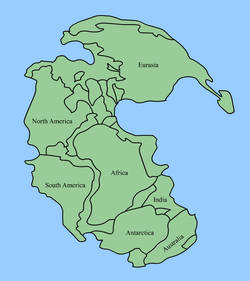 |
| Fossil records show Homo Sapiens living between 100,000 and 150,000 years ago in southern and eastern Africa, where their exodus from Africa is shown through linguistic, cultural, and lately computer genetic analysis. The hominids actually began communicating on some basic level around 2 million years ago, but around one million years ago the FOXP2 gene came into existence, giving the new hominid greater communication skills and helping them cooperate on a greater level, allowing them to eventually kill off the more primitive Neanderthal man (also because they were better able to cope with the upcoming ice age). Besides the use of tools, our communication skills and ability to cooperate gives us our greatest advantage above all other animals. |
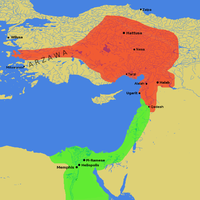 | Once leaving Africa, communication between the ever dispersing Homo Sapiens would have evolved further until we have the history of languages as has developed into what it is today. With the end of the ice age around 10,500 BC, the Sahara had become a fertile valley again, drawing to it Africa’s population from the interior and coastal regions. But the dry climate returned around 5,000 BC, forcing the population to move toward the Nile region in search of fertile ground. Agriculture and domestication of animals evolved up to 3,000 BC, around when the climate became dramatically drier and forced some populations to move to the more tropical climate of West Africa. Left: African Egypt expansion into the Middle East. |
| It was in northwest Africa that the Beaker culture originated, from which the warrior mentality emerged. Eventually many from the Great Lakes region of Africa would migrate and settle along the eastern Mediterranean to become the Canaanites, from which came the Phoenicians, who gave us our alphabet. The Phoenicians were the first great mariners and developed an extensive empire across the Mediterranean, eventually setting up their capital in Carthage on the north coast of Africa. It was there that they subdued the Berber people, who benefited greatly from trade. Carthage quickly grew into a great and unrivalled city on the Mediterranean, until it was finally ransacked and destroyed in 146 BC by envious Rome many centuries later. History of Ancient Egypt in Africa In the Nile region over a period of 3 millennia (from around 3000 BC) reigned the ancient Egyptian empire, which developed complex systems of irrigating the Nile river, their own writing system (hieroglyphs - recognised as the world’s oldest writing form) and culture until finally conquered by the Roman Empire in 31 BC (after it was ruled by Alexander the great for a certain period - although he generally allowed freer self-administration in his conquered territories). |
| The great river Nile, with its ability to offer transport and by its fertile deposit of silt with every annual flooding, enabled the peoples there to organise and become more efficient at food production, opening up free labour for such ambitious pursuits as pyramid building. The expanse of populations was so great that it was even divided into Upper (up river) and Lower Egypt. The region was inhabited and developed from as early as 11,000 BC, but in 3150 BC it was united under one head by Menes, who became their first king. This sophistication or water use and development of free time due to high productivity (the complex irrigation system created one of the main agricultural breadbaskets of the ancient world) led to many firsts developed in Ancient Egypt: engineering and surveying (used to outline pyramid bases), hydraulic cement, traditional empiricism, roots of the scientific method, possibly the first alphabet, the decimal system, and complex mathematical formulisations (not to mention coffee - from Ethiopia). | 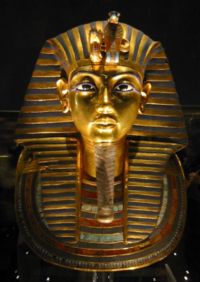 |
| Glass making was highly developed in ancient Egypt, and recent explorations have indicated that holes drilled into the sarcophagus, found in the great pyramid, used drill speeds and bore rates that cannot be duplicated even today. Other areas of question not yet answered by archaeologists and scientists alike is whether they had some understanding of electricity, if they used engines or batteries, or had some understanding of aerodynamics through the use of kites and gliders. Many are convinced that extraterrestrial aliens helped them with their development. History of the Bantu People in AfricaBefore the Bantu, the southern half of Africa is believed to have been populated by Khoisan speaking people, today occupying the arid regions around the Kalahari and a few isolated pockets in Tanzania; whereas Cushites and other people speaking Afro-Asiatic languages inhabited north-eastern and northern Africa. Northwestern Africa, the Sahara, and the Sudan were inhabited by people speaking Mande and Atlantic languages (such as the Fulani and Wolof) and other people speaking Nilo-Saharan languages. |
| Bantu means "people" in many Bantu languages. The Bantu had a distinct advantage because they developed a selection of crops better suited to tropical Africa, a farming culture which helped them to be more productive than the surrounding tribes, allowing them to support a greater warrior base and eventually subdue the others. This theory has also been supported by linguistic studies showing a high degree of similarity among African languages in general. The Bantu encompass more than 400 different ethnic groups across Africa, united by a common language family and, in many cases, by a common customs. Theories suggest that the Bantu may have been forced to migrate into the rainforest of Central Africa (phase 1 of expansion) due to populations migrating away from the drying Sahara. A thousand years later they began a more rapid and second phase of expansion beyond the rainforest into southern and eastern Africa, followed by a third expansion based on new agricultural techniques first developed in Zambia. | 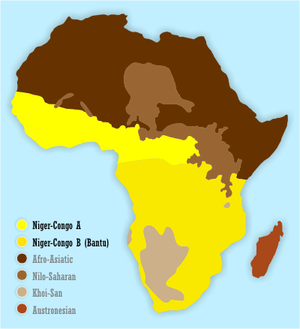 |
| By 1000 AD the expansion had reached Zimbabwe and South Africa, where in Zimbabwe a major empire was established with its capital in Great Zimbabwe and which controlled north-south trade of gold, copper, precious stones, animal hides, ivory, metal goods, and eventually slaves. The Arabs were long the main slave merchants in Africa, but some chiefs partook in the practice as a means to profit from clashes against other tribes. The slave trade scattered the Bantu empire until its eventual demise between the 14th and 15th centuries, its great capital left abandoned. Enslavement of AfricaAnother area where empires were formed was in West Africa, where important trade routes and extensive fertile land nurtured their development. North Africa also benefited from trade with other Mediterranean countries and was soon incorporated into that cultural sphere through dominance by the Roman Empire, and later by the Byzantine Empire. |
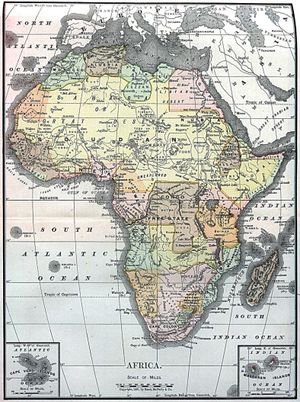 | From the 8th century until the late 16th century trade between with Mediterranean countries across the Sahara Desert by caravans of Arabian camels created important trade patterns and development. Perhaps due to more fertile ground in Europe, higher population growth there, and endless wars fuelling the technological arms race, development progressed faster there, until a lack of space prompted them to venture for new lands to expand to. This was started by the Portuguese in Africa, but was soon followed by the other major European powers. There was obviously much profit to be had from the trading of raw materials, and the Europeans used their more sophisticated and advanced weaponry to give them greater benefits of trade. The weapons were used to enslave populations, which were in turn used to extract natural wealth and increase profits. Intertribal factions were exploited to fuel the slave trade, where coastal African tribes hunted Africans inland (in exchange for metal cookware, rum, livestock, and seed grain) and helped exasperate the problem. Map of Africa in 1890. |
| The more developed Arab peoples infiltrated Africa from the east and were themselves very active in the slave trade. Concerning Europe, a triangulation of trade eventually developed with weapons shipped south, Africans shipped west to the Americas (to be used as cheap labour while extracting the mineral wealth found there), and from there raw materials were sent back to Europe for further processing. The Europeans carved up Africa, working inland from the coast and often along compass readings or rivers, inadvertently dividing up traditional nations of peoples who may have developed together along both banks of a major river. This unnatural division of people eventually contributed to much of the conflict presently visible in Africa today. |
| On the southern tip of Africa a small pit stop developed for mariners heading east to India and Asia for the purpose of trading in spices. However, the temperate climate of the region similar to Europe’s eventually led to its increased inhabitation by the Europeans. Perhaps because Africans possess the mother of our genes and a more robust gene pool, the continent was not afflicted so heavily by the European diseases which practically obliterated the Americas. On the contrary, the Europeans were afflicted by malaria, mostly because they were accustomed to settling in lower valleys and along rivers, where mosquitoes fester and where the epidemic was further exasperated by the fact that Europeans tend to live in much tighter quarters than do Africans. But with the enslavement of the continent the Africans were also shuffled into the developing urban centers and now suffer the same affliction. How the European powers carved up Africa. | 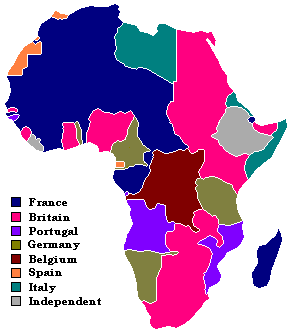 |
| With more endless European wars and lost battles, the losers often lost their grip (either through lack of resources to protect them or through war reparation agreements once another Europe-wide war was over) on their African colonies, who frequently passed over control to another power (mostly in the favour of the French and British). The coastal regions became dotted with fortresses and ports which gained great wealth for their controlling powers while raping and pillaging mother Africa of much of its wealth - both material and human. Even now it is said that poor countries possessing mineral wealth (such as oil) find such wealth rather a curse because they get tangled in agreements beyond their control, get exploited and run over by much more powerful nations, and become much worse off than if the mineral wealth had remained undiscovered (take East Timor as the most recent example). Melting Pot of CulturesAs you can see, from the Bantu originally spreading across much of Africa, the Egyptians up along the Nile, the Berber inland from the north, and eventually the Europeans with their fortress cities and compartmentalisation of Africa, the use of more advanced agricultural techniques and weaponry have been instrumental in shaping the more recent history of Africa and its cultural development in different areas. In the 7th century Arabs invaded Egypt and swept their way westward, consuming the entire north and practically obliterated any signs of Christianity there, even making it onto continental Europe to the mountains of France. Of this entire region, Christianity (Coptic) survived to some measure only in Egypt, mostly because of East Orthodox Ethiopia, almost the only African nation to maintain an independent hold on its territory throughout the long and bloody history of the continent (Ethiopia was spared by the Arabs because of its history of harbouring early Muslim converts against retaliation by pagan Arab tribes). |
| This Islamisation of the north has had a profound affect on Africa’s further development and spread south through trade and the camel across the Sahara, and along the east coast where the Arabs, Persians and Indians maintained flourishing colonies. The Turks, who conquered Constantinople in 1453, later established Algeria, Tunisia and Tripoli. Morocco remained an independent and Arabised Berber state. But camels don’t fair too well in dense rainforest, which is pretty well where the southern stretch of Islamisation stopped. However, as empires tend to go, the extent of the Islam empire across all of the Mediterranean met its peak and Christian Europe turned the tides, forcing the Muslims out of Spain, taking over North African countries and eventually developed commercial ties with Egypt. From that time until well into the 19th century, control of the northern coastal countries was unclear and often subject to insurgencies by the Islam Moors, who were forced out of Spain. | 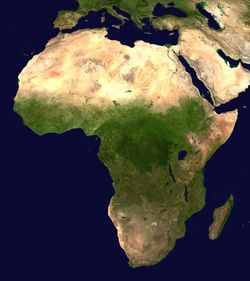 |
| Later, Egypt was occupied first by France, then by Britain, after which Turkey tried to gain control but which led to an agreement and an independent state, which from 1820 onward had free rule into Eastern Sudan. France took over Algiers in 1830 and Egypt continued its expansion southward until it discovered a great inland sea, sparking further interest for exploration by the Europeans, who were very intrigued to learn of the source of the river Nile. |
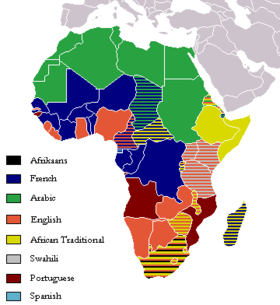 | Meanwhile, in the southern half of the continent, Protestant missionaries were performing their zealous expansionary work, often themselves converting to explorers and pioneers of trade and empire, such as David Livingstone. In this way, the last blank spots on the map of Africa were filled. Following the heals of these missionaries and explorers were European railways, a technology which helped open up the interior for further exploitation and the spread of different cultures. With the greed of manufacturers and traders on the one hand, and the philanthropic zeal to "Christianise the savage barbarians" on the other hand, the continent was partitioned and allocated into foreign ownership on the drawing tables of Europe (with the exception of Ethiopia and Liberia), without the slightest consultation of the Africans it was affecting. In some areas the conquests were primarily for economic reasons, while in other areas the dominion included an immigration of whites and the setting up of new communities and minority white-administered cities and zones. France even aspired to incorporating Algiers into its motherland, inasmuch making it an integral part of the European mainland. |
| But subduing Africa by white power alone was not sufficient but required the cooperation of local tribes, who exploited this weakness to work out agreements and strengthen themselves against other tribes. Inevitably such shifts in local power structures created friction and instability. Up to World War I Germany jumped late onto the colonial board, and during WWI the Africans witnessed the barbarity of European battles. Africans were summoned to help and they quickly realised their strength, and the newly exposed weakness of "invincible Europe". A new sense of African unity and pride developed because of this, although European hold on the continent remained strong. Mussolini even tried to take over Ethiopia, but this last unconquered African nation held out and sent the Italian troops scattering westward. Decolonisation and a New AfricaThen came WWII, where the demise of Germany’s influence in Africa fell with hammer to nail in coffin, and by 1951 Libya was the first in a long domino to free itself from the grips of colonial power (although Liberia, South Africa, Egypt and Ethiopia were already independent.) Most other African countries followed suit over the next two decades, sometimes with bitter wars, with the remaining gaining independence through the 70s and 80s (the last, Eritrea, split from Ethiopia in 1993). Many of the cities, even countries, originally founded by whites were given new names. But with a change of the guard, rebellions, and the ethnic and deep rooted tensions which arose because of the arbitrary borders drafted in Europe, instability in many parts of Africa ensued. Europe continued to profits from Africa by selling arms to the many warring factions, leading to further instability with the fumbling for new power. Even worse, some weapons, such as land mines, made it difficult for farmers to grow crops and who were maimed or killed in the process. Such instability, constant wars and lost arable land led to broad starvation and suffering. Most recently, the nationalisation and nab for land by president Robert MUGABE of Zimbabwe has led to a substantial decrease in crop yields there due to the poor training of the new landowners, or simply because the new owners profited shortsightedly by selling off all the captured farm equipment, leaving the fields to rot. Horrible atrocities were committed between the Hutu and Tutsi tribes in Rwanda, a segregation of very similar people and first begun by the Belgians. |
| Then we have the painful Darfur situation. It seems the mark of African exploitation will still be felt for several decades, but the international community is slowly coming on board to help this inflicted continent. Debts are slowly being written off to enable some of these nations to rebuild, and there is some hope in new technology, such as the 100 dollar PCs, solar and other renewable energy, the internet, and a continent-wide wireless network. With such technology Africa is expected to undergo a major revolution within the next decade or two, when it will leapfrog and hook up to the global internet structure. This could bring needed income into poor and rural areas and hopefully bring the entire continent out of its present problems, into a new and prosperous area. But global warming and diseases such as aids and malaria are crippling much of its development and could for some time still. The changing global weather patterns could hit Africa particularly hard, which is not financially prepared to recover as easily as the wealthy west. The west has profited greatly from a brutal exploitation of this our mother continent and should take up its responsibility to return some of that wealth and help these nations to their feet. |

